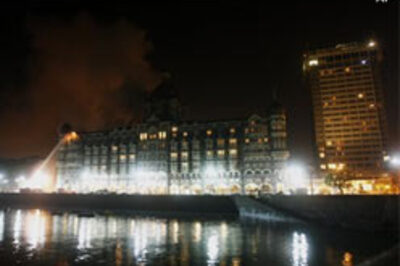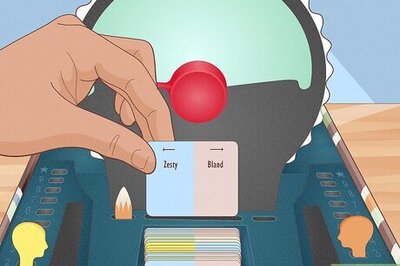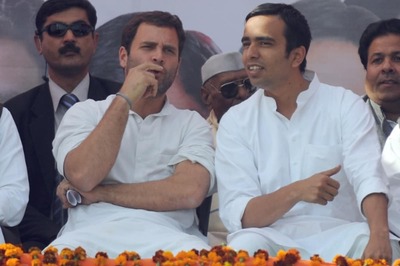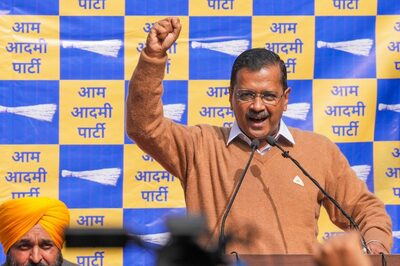
views
Paris: Iran rejected a six-nation offer of incentives to stop enriching uranium on Saturday, prompting US President George W. Bush and French President Nicolas Sarkozy to jointly warn Tehran anew against proceeding toward a nuclear bomb.
''Our allies understand that a nuclear-armed Iran is incredibly destabilizing, and they understand that it would be a major blow to world peace,'' Bush said at a news conference with Sarkozy at Elysee Palace.
The quickly unfolding series of events began in Tehran, where European Union foreign policy chief Javier Solana played the role of messenger for the offer from the United States, France, Germany, Britain, Russia and China.
Solana presented the plan, a refreshed version of a 2006 package that Iran ignored to Iranian Foreign Minister Manouchehr Mottaki and its top nuclear negotiator, Saeed Jalili. There were no plans for Solana to see Iran's hardline president, Mahmoud Ahmadinejad.
Even before Solana's meetings, however, Iran gave its pre-emptive judgment of the deal that holds out the promise of economic, technological, educational and political rewards: dead on arrival, assuming the offer is conditioned on Iran halting its uranium enrichment, which it is.
''If suspension is included in the package, it won't be considered at all,'' the official IRNA news agency quoted Iran's government spokesman, Gholam Hossein Elham, as saying Saturday. ''The position of the Islamic Republic of Iran is clear. Preconditions can't be raised for any halt or suspension.''
Bush and Sarkozy were informed of this as they went into morning meetings. Their session capped warm talks that began over an elegant palace dinner Friday night. When the U.S. and French leaders appeared together before reporters in a grand palace hall around lunchtime, they presented a single front contrasting with the tension shown between Bush and Jacques Chirac, Sarkozy's predecessor.
''I'm disappointed that the leaders rejected this generous offer out of hand,'' Bush told reporters.
Sarkozy said, ''As far as military nuclear access is concerned, this is 'no' on the part of the international community.''
Bush said the issue has been dominating his discussions this week with leaders as he travels through Europe. With his time in office ticking down and it widely presumed that Iran could have enough fissile material for a weapon within a few years, Bush has been hoping to inject new urgency into the extremely slow-moving diplomatic process. Iran claims its enrichment is to generate nuclear energy, while the West believes it is designed as part of a now-dormant warhead program that could easily be restarted.
The package is hardly different from the 2006 offer, said a senior State Department official. It includes ''more meat in terms of how Iran could prosper'' from going along with it, including new help developing civilian nuclear power in the form of energy partnerships and other measures, said the official, who spoke on condition of anonymity to more freely describe the offer.
The official said that Tehran's dismissive stance was expected and that allies will allow some time before acting, in the hope that officials there will decide to more seriously weigh the proposal.
Perhaps reflecting this, Bush did not repeat his strongest rhetoric on Tehran, which he has repeatedly threatened with new sanctions or even the last-resort possibility of a military strike if it remains defiant.
The farthest the president went Saturday was to promise the implementation of existing sanctions three rounds of mild penalties through the auspices of the United Nations. He said the United States was ''working with our friends and allies'' on unspecified tasks.
Both Bush and Sarkozy gave special emphasis to their position that Iran is entitled to civilian nuclear power, but it can't be trusted to enrich. And they spoke in unison on the point that the people there have a right to be better represented by a government that Bush said is ''creating the depravation inside Iran.''
''Our view is we want the Iranian people to flourish and to benefit,'' he said.
It was left to Sarkozy to augment this softer message with tough talk.
''If Iran gets a nuclear bomb, that is totally unacceptable,'' he said. ''Our position will not change.''
Like Bush, he declined to offer specifics about what allies will do next. But, he said, ''The only solution ... is a faultless, seamless sanctions regime.''
Europeans have appeared more inclined recently to get aggressive about current loosely enforced sanctions, to support new, tougher ones at the UN, and to possibly even adopt unilateral measures to squeeze oil-rich Iran by curtailing dealings with its banks.
Bush and Sarkozy spoke with one voice on Syria as well, saying that it must stop backing terrorism that destabilizes the Mideast and calling it a dangerous partner with Iran in that effort.
In a warning to Syrian President Bashar Assad, Bush said, ''Stop fooling around with the Iranians and stop harboring terrorists.''
In a statement issued by the French presidential palace, the United States and France sought to dispel signs that they have divergent thoughts on Syria. Sarkozy also sought to play down a growing controversy about an invitation extended to Assad among other Arab leaders to France's Bastille Day military parade next month, and plans to include Syria in a new Union for the Mediterranean that Sarkozy has championed.
''If, when we go around the Mediterranean, we start by only inviting the countries that meet our exact criteria, that runs the risk of holding a meeting where very few people attend,'' Sarkozy said.
Bush also was confronted with questions about Iraq, and his administration's desire to negotiate with Baghdad a long-term deal to provide the legal authority and rules covering an ongoing US military and diplomatic presence there.
Iraqi Prime Minister Nouri al-Maliki declared Friday that initial talks with the US were deadlocked, in part over American demands such as immunity for US troops and the ability to detain terror suspects. Al-Maliki said talks would continue.
Bush was upbeat.
''If I were a betting man, we'll reach an agreement with the Iraqis,'' he said.
Bush said the US side would ''work hard'' on answering Baghdad's concerns. But he did not promise that Washington would give up its most controversial proposals. A UN mandate for the US military mission expires at the end of the year.




















Comments
0 comment